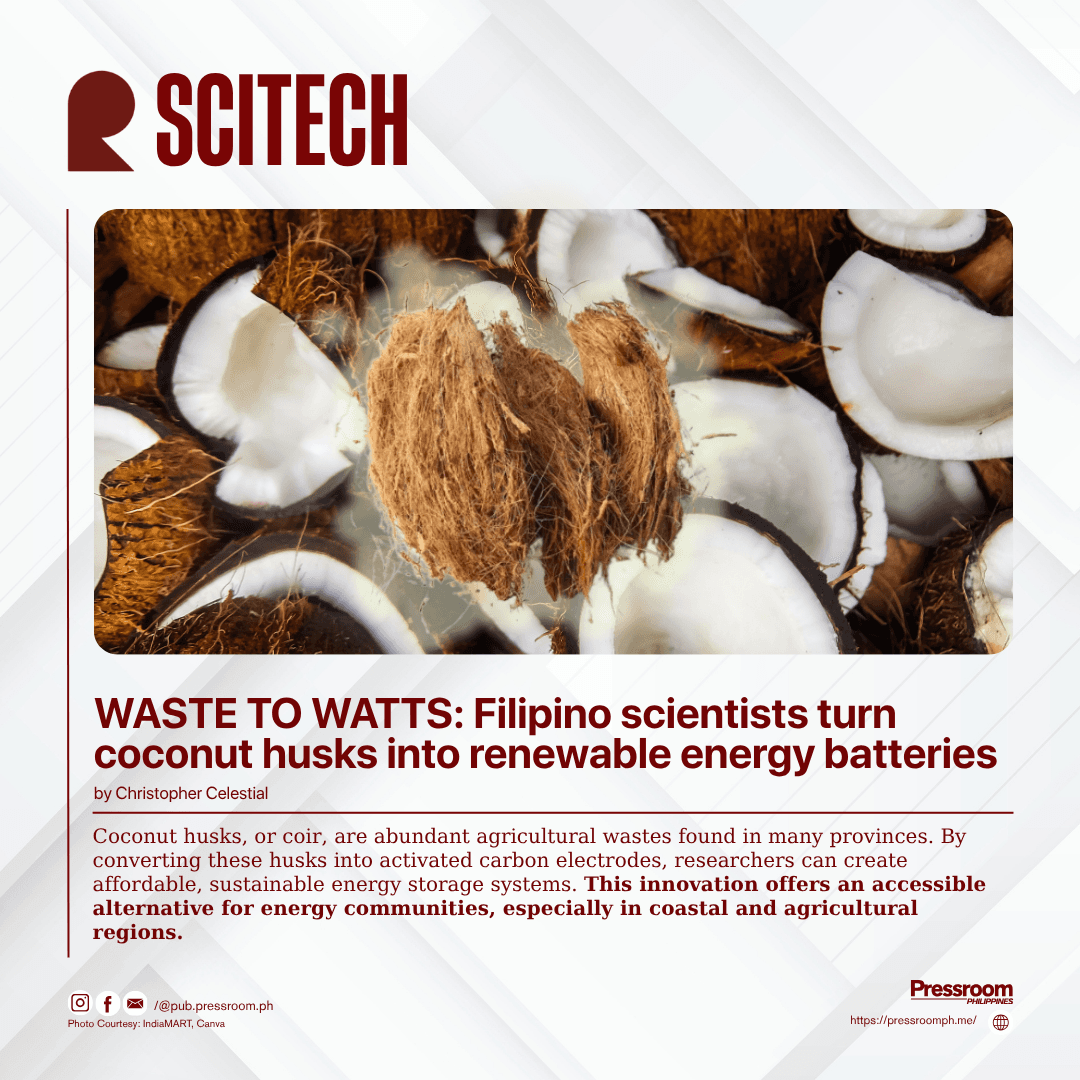Scientists in the Philippines are turning coconut husks into powerful, eco-friendly batteries that can store renewable energy efficiently. Developed in 2025 by Filipino researchers from the Department of Science and Technology (DOST), the project aims to reduce the country’s reliance on imported lithium and support clean energy initiatives in rural areas.
Coconut husks, or coir, are abundant agricultural wastes found in many provinces. By converting these husks into activated carbon electrodes, researchers can create affordable, sustainable energy storage systems. This innovation offers an accessible alternative for energy communities, especially in coastal and agricultural regions.
Through advanced carbonization and chemical activation methods, these coconut-based batteries demonstrate strong energy density and long lifespan comparable to commercial lithium-ion cells. Filipino scientists emphasize that this locally sourced material can boost the renewable energy transition and rural electrification programs.
From Husk to Power: Science Behind the Innovation
Researchers extract lignin and cellulose from dried coconut husks, transforming them into carbon-rich materials through pyrolysis. This process removes volatile substances and leaves behind porous carbon ideal for electricity storage. The resulting activated carbon becomes a critical component for electrodes in supercapacitors or hybrid batteries.
Filipino chemists have developed cost-effective methods to activate the carbon using potassium hydroxide, enhancing its surface area and conductivity. These scientific techniques improve energy absorption and release rates, essential for renewable systems like solar and wind power storage.
Laboratory tests show that coconut-husk-based batteries can handle high charge-discharge cycles with minimal degradation. These properties make them suitable for long-term use, even under the humid tropical climate of the Philippines.
Green Power for a Sustainable Future
Using coconut husks for energy storage addresses both environmental and economic concerns. It minimizes agricultural waste while providing a renewable, biodegradable resource for power generation. Farmers can benefit from new income opportunities as suppliers of raw materials.
Communities dependent on off-grid energy systems, such as those in Bicol, Mindanao, and Palawan, could gain access to affordable, stable electricity through this technology. Coconut-based batteries also complement solar panels, allowing excess power to be stored for nighttime or emergency use.
This innovation aligns with the Philippines’ Renewable Energy Act and national goals for sustainable development. By utilizing local resources, the country strengthens energy security while promoting environmental stewardship.
Challenges on the Road to Commercialization
Despite its promise, coconut-husk battery technology faces challenges in large-scale production. Researchers must refine processes to maintain consistent quality and ensure that energy capacity meets industry standards. Cost of materials for chemical activation also affects production feasibility.
Environmental experts caution that improper carbonization may emit harmful gases if not monitored. Strict laboratory protocols and eco-friendly techniques are vital to maintain the project’s green credibility.
Funding and government support remain crucial for scaling up the technology and ensuring it reaches communities that need it most. Without sufficient backing, the project risks remaining a laboratory success instead of a nationwide innovation.
Coconut husk batteries stand as a shining example of Filipino ingenuity—transforming agricultural waste into a renewable energy solution. By bridging science and sustainability, this innovation paves the way toward a cleaner and more energy-secure Philippines. As researchers continue refining the technology, coconut husks may soon power not just lamps in rural homes, but the nation’s bright future in renewable energy.




